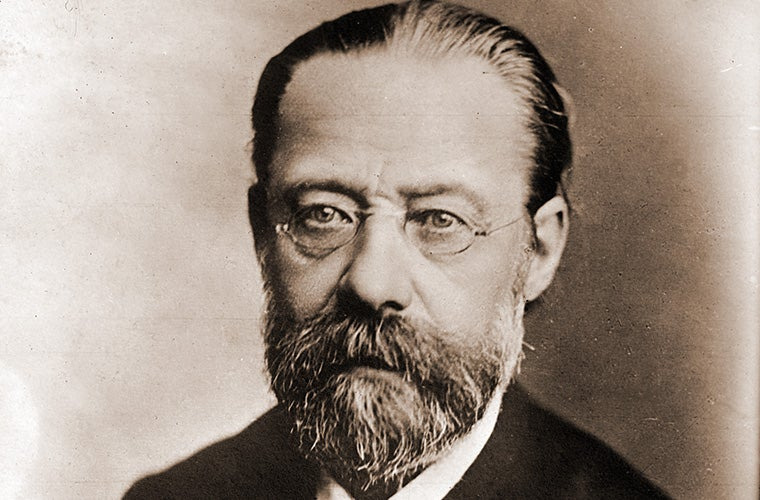1848년 프랑스 2월 혁명은 유럽 강대국의 지배를 받고 있던 민족들에게 자신의 정체성에 눈을 뜨게 한 커다란 사건이었다. 이에 따라 프라하에서도 학생과 노동자들이 구심점이 되어 오스트리아 정부군과 맞서 항전을 벌였지만 그 결과는 참담한 패배였을 뿐이었다. 이 투쟁에 참가했던 24세의 젊은 음악가가 있었다.

베드르지흐 스메타나Bedrich Smetana. 베드르지흐는 '풍성한 평화'라는 뜻의 독일 이름 프리드리히Friedrich에 해당하는 이름이다. 그는 오스트리아의 무자비한 탄압을 몸소 겪고 나서 자신이 체코 사람임을 절실히 느끼고 민족의 혼이 담긴, 체코 민족 특유의 근대 음악을 수립하고자 노력했다.
그도 후세의 카프카처럼 독일어를 모국어로 쓰던 체코인이었다. 그가 체코어를 배우기 시작한 때는 이미 서른이 넘어서였으니 그의 체코어 이해력이나 구사력은 한계가 있었으리라. 그는 그러한 약점에도 불구하고 중부 유럽 음악의 주류에 뿌리를 두면서도 체코의 역사, 영웅담, 전설, 민속 등과 같은 민족적 책채를 첨가시키거나 체코의 풍경을 표제로 하는 등, 체코 음악이 나아갈 길을 제시했다.
당시 그를 물심양면으로 적극 후원해준 인물이 있었으니 바로 유럽음악계의 황제 리스트였다. 리스트는 스메타나를 "순수한 체코의 정신을 타고난 작곡가이며 신의 은총을 받은 예술가"라고 극찬했다. 한편, 스메타나의 17년 후배인 드보르작은 스메타나가 다져놓은 토양 위에 체코의 음악을 세계적인 음악으로 발전시킨 장본인으로 지명도에 있어서는 스메타나보다 훨씬 더 높다. 하지만 스메타나만큼 체코 사람들의 마음속 깊이 자리 잡은 음악가는 없다.
https://youtu.be/f72842vZufg?si=vXZ7PLqKro-3FmF9
The February Revolution of 1848 in France was a major event that awakened the peoples under the rule of the European powers to their own identity. Accordingly, students and workers in Prague also became the center of resistance against the Austrian government forces, but the result was a miserable defeat. There was a young musician who participated in this struggle, aged 24.
Bedrich Smetana. Bedrich is the German name Friedrich, meaning 'abundant peace'. After personally experiencing the merciless oppression of Austria, he felt strongly that he was a Czech and tried to establish modern music unique to the Czech people that contained the soul of the people.
Like Kafka, he was a Czech who spoke German as his native language. He was already in his thirties when he began learning Czech, so his understanding and speaking skills in Czech must have been limited. Despite such weaknesses, he suggested the path for Czech music to take by adding national elements such as Czech history, heroic tales, legends, and folklore while maintaining his roots in the mainstream of Central European music, and by using Czech landscapes as titles.
At that time, there was a person who actively supported him in both material and spiritual ways: Liszt, the emperor of European music. Liszt praised Smetana as "a composer born with the pure Czech spirit and an artist blessed by God." On the other hand, Dvorak, who was 17 years Smetana's junior, is the one who developed Czech music into world-class music on the foundation laid by Smetana, and is much more famous than Smetana. However, no musician has taken a place as deep in the hearts of Czech people as Smetana.
'Music Story' 카테고리의 다른 글
| 파야: 스페인 정원의 밤(Manuel de Falla y Matheu: Noches en los jardines de España) (41) | 2025.01.06 |
|---|---|
| 하이든의 오라토리오(Haydn's Oratorio) (52) | 2024.12.30 |
| 글루크 : 오르페우스와 에우리디체(Gluck: Orfeo ed Euridice) (87) | 2024.12.14 |
| 베토벤 피아노 협주곡 제3번(Beethoven Piano Concerto No.3 in c minor, Op.37) (85) | 2024.11.24 |
| 베토벤 바이올린 소나타 9번 <크로이처>(Beethoven Violin Sonata No. 9 in A major, Op. 47, "Kreutz (67) | 2024.11.22 |



